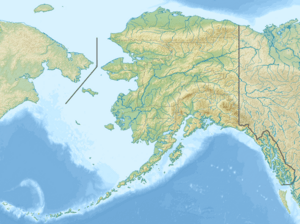Kuzitrin River facts for kids
Quick facts for kids Kuzitrin River |
|
|---|---|
|
Location of the mouth of the Kuzitrin River in Alaska
|
|
| Country | United States |
| State | Alaska |
| District | Nome Census Area |
| Physical characteristics | |
| Main source | Kuzitrin Lake 13 miles (21 km) south of Imuruk Lake, Seward Peninsula 302 ft (92 m) 65°26′59″N 163°48′43″W / 65.44972°N 163.81194°W |
| River mouth | Imuruk Basin 30 miles (48 km) southeast of Teller 7 ft (2.1 m) 65°10′03″N 165°25′12″W / 65.16750°N 165.42000°W |
| Length | 95 mi (153 km) |
The Kuzitrin River is a stream located in Alaska, a state in the United States. Its name in the Inupiaq is Kurritqiun. This river flows across the Seward Peninsula, a large land area that sticks out into the Bering Sea.
Contents
About the Kuzitrin River
The Kuzitrin River starts at Kuzitrin Lake. This lake is found in the middle part of the Seward Peninsula. From there, the river travels about 95 miles (153 km) towards the west.
Where the River Flows
The river ends its journey by flowing into the Imuruk Basin. This basin is a large natural bowl-shaped area. Water from the Imuruk Basin then drains into Port Clarence. Port Clarence is a bay that connects to the vast Bering Sea.
River Branches and Connections
Like many rivers, the Kuzitrin has smaller rivers and streams that flow into it. These are called tributaries. Some of the important tributaries of the Kuzitrin River include the Noxapaga, Kougarok, Kruzgamepa (also known as Pilgrim), and Kugruk rivers. These smaller rivers add to the Kuzitrin's flow.
The River's Name
The name "Kuzitrin" comes from the Inuit languages. Explorers from the United States Geological Survey first wrote down this name in 1900. Later, in 1950, the United States Board on Geographic Names officially approved it. This board is responsible for naming places in the U.S.
Life Along the River
The Kuzitrin River area has been important for people for a long time. It provides resources for living.
Mary's Igloo Village
Near the lower part of the Kuzitrin River, there is a place called Mary's Igloo. This was once a village. Today, no one lives there permanently. However, people from the nearby village of Teller still use Mary's Igloo. They visit the area for "subsistence activities." This means they gather food and other things from nature, like hunting, fishing, and collecting plants, to help support their lives.
 | Stephanie Wilson |
 | Charles Bolden |
 | Ronald McNair |
 | Frederick D. Gregory |


